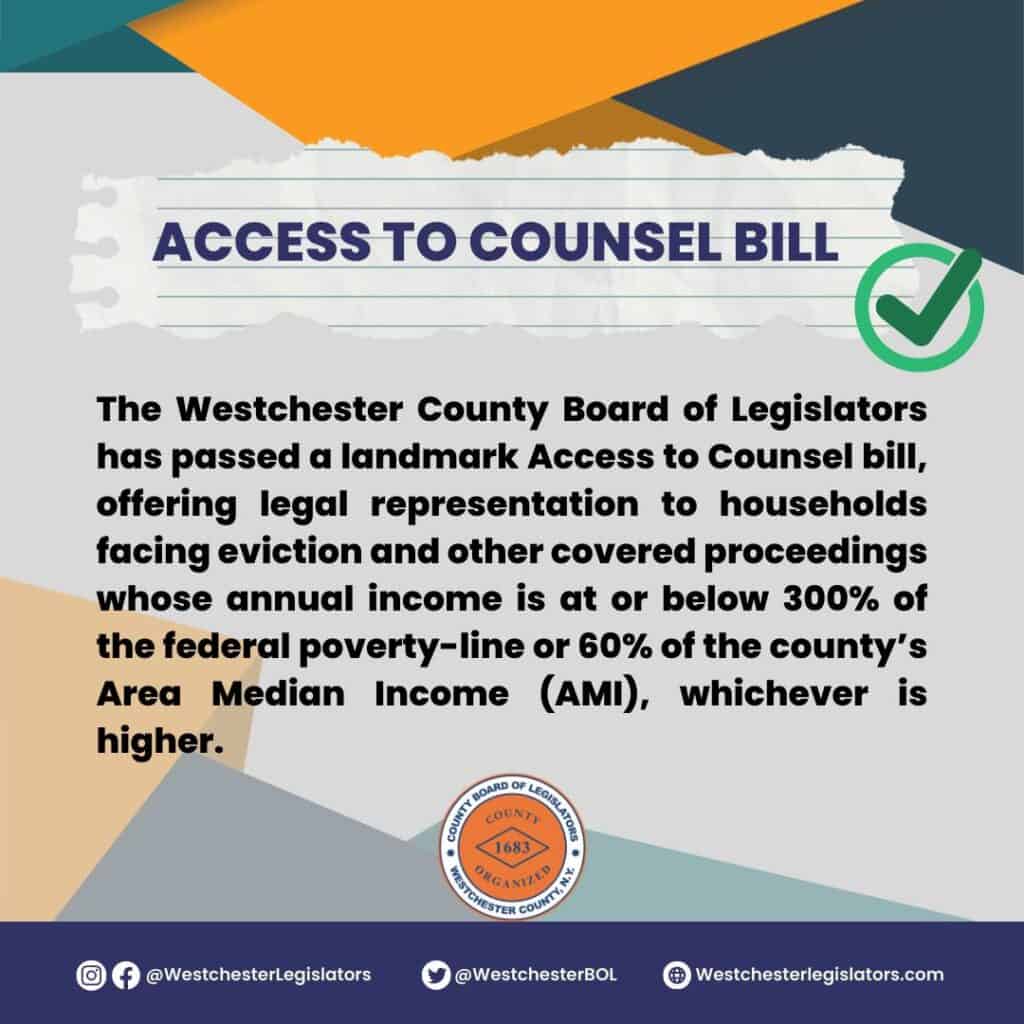
The Westchester County Board of Legislators passed a landmark Access to Counsel bill, offering legal representation to households facing eviction and other covered proceedings whose annual income is at or below 300% of the federal poverty-line or 60% of the county’s Area Median Income (AMI), whichever is higher. The bill was approved by unanimous vote on Monday night.
Across the country, a number of jurisdictions have enacted Access to Counsel laws, otherwise known as Right to Counsel, ensuring tenants facing eviction proceedings are provided with an attorney. This law provides for access to legal representation for tenants facing eviction and/or specified covered proceedings, including challenges to an unlawful rent increase, instances where a tenant has been illegally locked out by their landlord, and tenants seeking the restoration of essential services. The law is a critical step towards creating a more just and equitable society, particularly for those who have historically been forced to navigate the complexities of housing court without legal representation.
Vice Chair Nancy Barr highlighted the importance of ensuring fairness and justice for all tenants, regardless of their income or background. “For too long, low-income tenants have faced a legal system that is stacked against them, leaving them vulnerable to displacement and homelessness,” said Barr. “Homelessness leads to other problems, such as joblessness, disruptions in children’s education, and stigma. Programs that provide legal counsel to low income tenants have proven to be very successful in keeping people in their homes.”
With the end of the eviction moratorium in early 2022, eviction filings in New York State have climbed sharply, leaving tens of thousands of tenants without legal representation. Despite warnings from housing advocates and legal professionals, the state has yet to adopt a statewide Right to Counsel law, leaving vulnerable communities at risk of displacement and homelessness. This is where Westchester’s bill bridges the divide.
From 2020 to 2021, New York was able to hold off a sharp increase in evictions with rental assistance programs and the eviction moratorium. However, with the end of the moratorium, the New York State Unified Court System sped up the processes leading to a significant rise in eviction filings. This has left many struggling tenants facing eviction without the legal support they need.
The Access to Counsel bill establishes an Office of Housing Counsel. Once a director is hired, they will have six months to establish a plan to provide eligible tenants with legal assistance at no cost. With access to legal support, tenants will be better equipped to navigate the complex housing court process and defend their rights.
Majority Leader Christopher Johnson exclaimed, “The passage of an Access to Counsel bill is not just a legal victory, but a moral imperative. It is a crucial step towards creating a more equitable and just society, particularly for vulnerable communities who have historically been denied access to legal representation. By providing a level playing field, we can empower individuals when they need it most.”
Housing Committee Chair Legislator Tyrae Woodson-Samuels said, “The data speaks for itself: Access to Counsel programs have a proven track record of success across the country. Studies have shown that tenants with legal representation are much more likely to prevail in eviction cases, and are far less likely to face homelessness or displacement as a result. By passing an Access to Counsel bill, we can ensure that everyone has access to these critical legal resources, regardless of their income or background, and create a more just and equitable society for all.”
Legislator Catherine Borgia added, “The importance of passing an Access to Counsel bill cannot be overstated. Studies have consistently shown that access to legal representation dramatically increases the chances of success for individuals facing a range of legal issues, including eviction, immigration, and family court. I’ve worked on this bill for over 4 years, after visiting local courts and witnessing how tenants without representation rarely fared well against landlords who largely had attorneys representing them. I hope this new legislation sets a standard for other counties and New York State to follow.”





